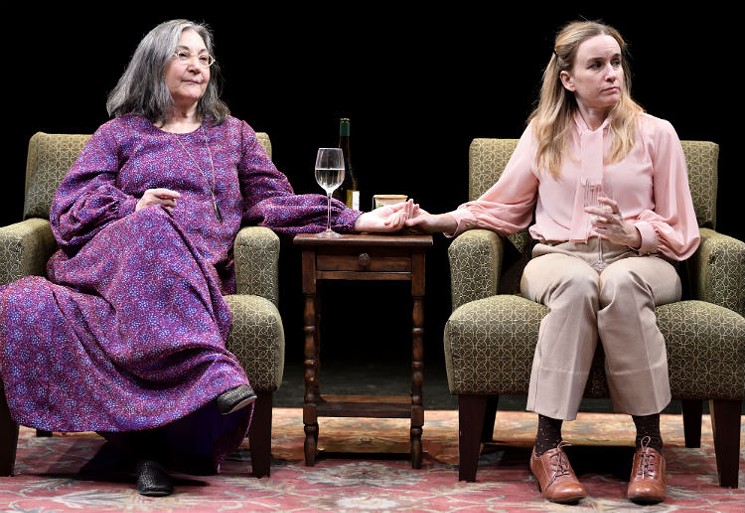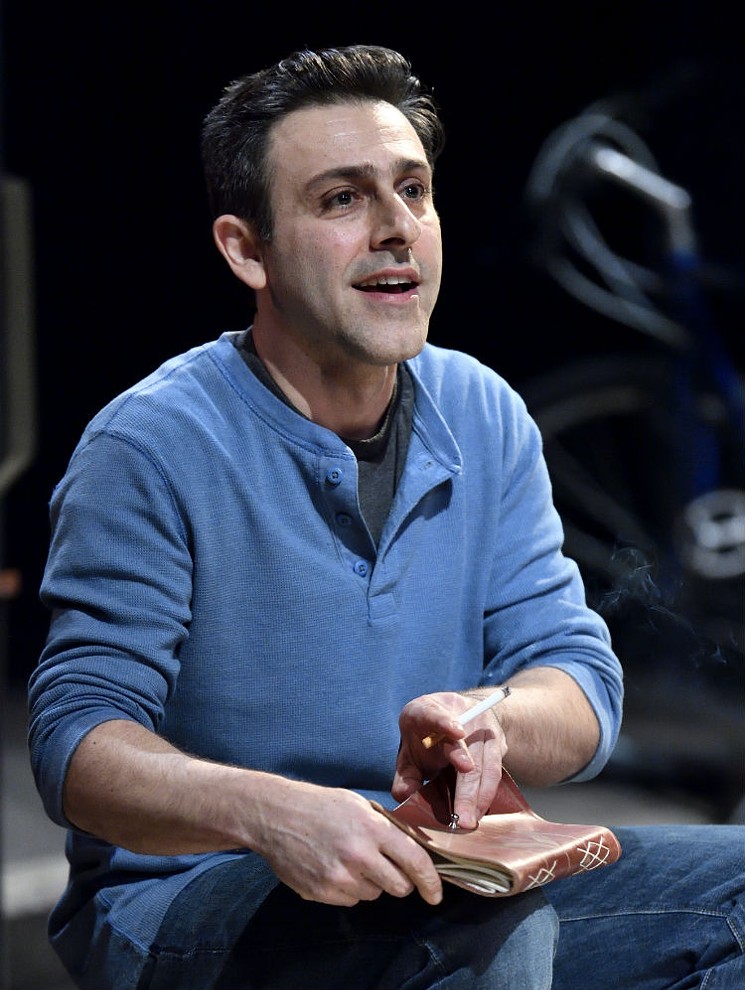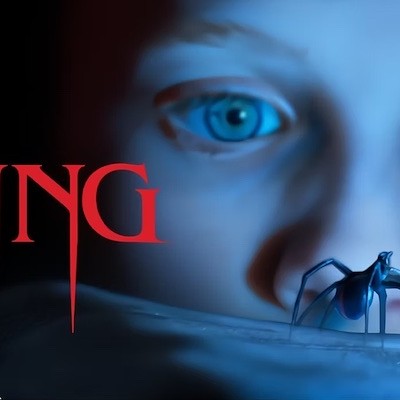
Who's scamming who? The psychic (Robin Bartlette) and Emily Cass McDonnell in The Thin Place by Lucas Hnath
Photo by Jonathan Roberts
The scam is having its moment in America. Bigger than a moment, actually, more like a mini-era. Just think about the last couple of years and how much of our news, concern, anxiety, gossip, and outright obsession has been focused on one kind of scam or another.
Facebook data mining, election hacking, Wells Fargo fraudulent accounts, Frye Festival, Theranos, fake news, Jussie Smollett, the college admissions scandal, the prosecuted swindles stemming from the Trump administration. The list could go on. Fraud, it seems, presently touches all our lives in some way or another with consistent vigor.
So when you gather a bunch of American playwrights to premiere their work at the 43rd annual Humana Festival of New American Plays in Louisville, Kentucky, it’s no big surprise that the notion of the scam will show up on stage. If Americans are thinking about being scammed, you can bet American playwrights are writing about it. What is surprising however is how many ways these diverse, contemporary playwrights reflect this era of ubiquitous deceit back to us.
Mercifully, none of the shows on offer at this year’s Festival (many of which will no doubt make it to Houston at some point) take an ‘on the nose’ approach. Of the five plays, you won’t find a single story ripped from the headlines, and yet each show feels at times uncomfortably familiar as we recognize or are blatantly shown the scam within the narrative.
“Well you do understand, don’t you, that what I do is sort of a trick. Right? Nothing to it, really. It’s more about listening than anything else. I always start with names —I just say whatever names jump into my head, ‘an I keep sayin’ names until someone in the room claims a name as being important to them.”
This confession from Linda, the motherly but savvy psychic in Lucas Hnath’s absorbingly spooky and superb, The Thin Place. Houstonians will remember Hnath from the Alley Theater’s 2016 production of his play, The Christians, and will recall that Hnath has a tendency to ask, rather than answer questions in his work. The same is true for The Thin Place, which ponders what happens after death. Are we ever really gone and what space is left for us to connect with the deceased after they cease to exist? Is it advisable to be too open to belief? “Can you have such an open mind that your brain falls out?”
That last question belongs to Hilda, the central character in the play. A young-ish woman (who may or may not be able to speak to her dead grandmother) who befriends Linda out of envy for her psychic powers. But the powers are a scam. So potentially is Linda’s belief that she’s actually helping people with her hoodwink. However, it’s the more delicate and slippery scams peppering the play that are truly riveting. Hilda’s potential paranormal abilities and her real motivation for not only befriending Linda but remaining her friend even after she’s exposed as a fraud – these types of uncertain scams scare us most as they’re ultimately not fully knowable.
Cabalistic and enigmatic scams are most decidedly not on the menu in Dave Harris biting satire Everybody Black, a wildly funny takedown of racial expectations and definitions. The scam here is blatant and we’re all in on it, thanks to the play’s narrator, a black historian, who’s being paid gobs of money by wealthy white folks to write the definitive version of The Black Experience™. The problem is, well, let’s let his words explain:
“I know nothing of history. People assume all the time that cuz I’m a Black Historian, I’m the ambassador to Negrohood. Truthfully I’ve never even met a Black person. Not a single one. I only know two Black people: me and my reflection. Ok? The Race Problem. HAAAAAA.

J. Cameron Barnette as the Black Historian in Everybody Black by Dave Harris
Photo by Jonathan Roberts
Here we’re presented a scammer, not
Inside his exploration of The Black Experience™, Harris is showing us both the micro and meta scam. If the whole game is rigged, can any one person really be a scammer? Or is the scammer in a fraudulent system actually the only truth teller? The whistleblower on all the bullshit? The one we should be celebrating?
In Lily Padilla’s, intense and provocative How To Defend Yourself, white university student Brandi is oh so earnestly trying to blow the whistle on a scam. She’s leading a self-defense workshop for her fellow female students following the brutal sexual attack of her roommate by two fraternity brothers. The scam as she sees it is that women are helpless in the face of violence. Calling her students “warrior princesses” and promising them all “fighter skills,” Brandi believes that all any woman needs is to master a few moves and safety will be hers.
Of
What Padilla presents is the well-intentioned scammer, someone who truly wants to do good, but ultimately fails those she tries to help. Does that make the scammer a monster, a false prophet or simply misguided? How do we judge those that are too naïve to even know they’re scamming anyone?
And how do we parse those who scam only themselves? In The Corpse Washer, adapted for the stage by Ismail Khalidi and Naomi Wallace from the novel of the same name by Sinan Antoon, we meet Jawad, an Iraqi trying to navigate life through the Iran-Iraq war, U.S. sanctions and subsequent invasion/occupation. Unlike the complex narratives of the prior shows, The Corpse Washer is sorely formulaic as is Jawad’s self-delusion.
Is he to pursue his dreams of leaving Iraq to become an artist or honor his father by taking over his business of washing the dead prior to burial, an honored Muslim tradition? In this kind of story, we all know what Jawad will choose, even though we must pretend we don’t. So the scam here is two-fold – both planned and unplanned. Narratively we are given the self-delusional scam, Jawad’s assertions that he can or will leave behind his family, country and tradition, and the ruse of unsophisticated storytelling that asks the audience to be moved by a narrative where everything is expected.

Arash Mokhtar as Jawad in The Corpse Washer by Ismail Khalidi and Naomi Wallace
Photo by Jonathan Roberts
While the previous four plays concern scams between individuals or imposed on the self, We’ve Come to Believe, takes a much grander view and dives into the kind of scam that ensnares masses of people. Written by Kara Lee Corthron, Emily Feldman and Matthew Paul Olmos, this is a show about the collective scam, the groupthink mentality and our willingness to participate in it.
Structured as a series of short absurd and humorous scenes, this hit and miss show delves into the issue of cults, witch hunts, online culture, fears of white genocide and even alien abduction. How do all these people become entranced by and then entrenched in their panic ridden-irrational beliefs?

The cast of We've Come to Believe by Kara Lee Corthron, Emily Feldman and Matthew Paul Olmos.
Photo by Jonathan Roberts
And yet Humana playwrights had a gift to give us this year. In addition to some thrilling new work, they exposed the variance and craftiness of the scam and our place in juxtaposition. They showed we could be spooked by it, be champion in spite of it, have our good quashed by it, internalize it and lean into it.
Most importantly, in their own subtle and sometimes not so subtle ways, these plays encouraged us to keep watch and be critical of the potential or presence of the scam. To say these American playwrights are hopeful of what we can accomplish in doing so is a stretch. But at least they want us to try.








